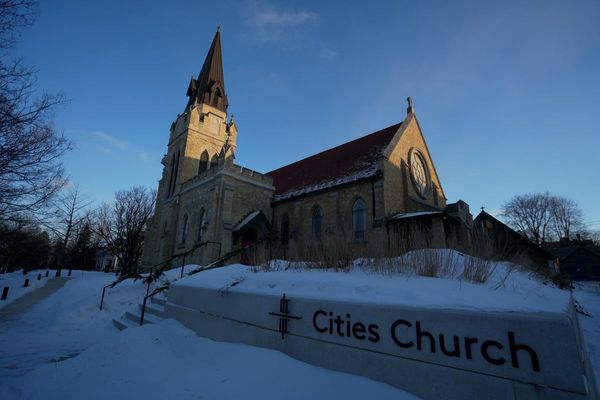
When the vice-president of the United States took Sir Keir Starmer to task earlier this year for failing to uphold free speech, the Prime Minister was quick to hit back. “In relation to free speech in the UK, I’m very proud of our history there,” he said. “We’ve had free speech for a very long time, it will last a long time, and we are very proud of that.”
As the head of the Free Speech Union, I wish I was as sanguine as the Labour leader. Our membership has doubled in size since the last election, with our six-person case team having to contend with 25 new cases a week.
Some of our high-profile cases have hit the headlines, such as Hamit Coskun, the Turkish political refugee who was prosecuted for burning a copy of the Koran outside the Turkish consulate in Knightsbridge. Last month he was found guilty of disorderly behaviour and causing harassment, alarm or distress, but with our assistance he’s going to appeal that verdict.
We had more success helping Julian Foulkes to sue Kent Police. The retired special constable was arrested, held in a cell for eight hours and released only after he’d agreed to accept a caution — all for a single tweet supporting Israel’s right to defend itself. Not only did he secure an apology from the Chief Constable of Kent, he also got £20,000 in compensation.
But most of our cases are below the radar, involving ordinary people who find themselves in trouble because of an unguarded remark on social media or in a community chat forum.
As Lord Lebedev points out in his speech today in the House of Lords — and printed on page 23 — the police are arresting more than 12,000 people a year under suspicion of breaking just two laws: section 1 of the Malicious Communications Act 1998 and section 127 of the Communications Act 2003. That’s an average of more than 30 people a day being hauled into police stations and interviewed under caution because they are suspected of committing a speech offence.
In addition to Coskun, we’ve defended two other people who have got into trouble for burning copies of the Koran — one of them is due to stand trial in October — and several people who have been charged with stirring up racial hatred, an offence which carries a maximum sentence of seven years.
According to our most recent case data, the thing most likely to get you into trouble is saying something intemperate about race or immigration — not just with the police, but with your employer or university. A recent poll found 36 per cent of Britons feel they have to hold back on expressing their views on race or ethnicity, while 32 per cent are afraid to say what they think about immigration or religious extremism. Overall, 49 per cent of those polled think people are too easily offended.
Labour’s “banter ban” is set to be introduced next year
And if you think we’re walking on eggshells now, things are about to get worse. In spite of my efforts to oppose it in the Lords, Labour’s “banter ban” is set to be introduced next year, whereby employers in the hospitality sector will be forced to take “all reasonable steps” to prevent their employees overhearing conversations or remarks made by customers they are likely to find offensive. The days when every pub was a parliament, in which people were able to speak freely about hot-button issues, will soon be behind us.
Underlying this clampdown is the Government’s pathological fear of social disorder. A stark illustration of this was the revelation this week that the Ministry of Defence has alerted all government departments of possible riots following the news that tens of thousands of Afghans who cooperated with the Army have been quietly slipped into Britain after a data leak revealing their names. It is this terror of Britain’s cities descending into chaos, with different racial and religious “community groups” at each other’s throats, that is behind the recent rise in arrests and prosecutions for “hate speech”.
The very same Labour politicians who, for so long, have praised multiculturalism and claimed “diversity is our strength” seem to be gripped by fear that large parts of Britain have become powder kegs, set to explode if people are allowed to say what they really think about contentious issues like the grooming gangs. All grievances must be suppressed in the name of preserving “community cohesion”.
As a believer in free speech, I don’t share this dystopian view of contemporary Britain. Yes, we are becoming a more atomised society, with some areas of Bradford and Birmingham where little English is spoken. And, yes, there are sometimes outbreaks of ethnic and religious conflict in cities like London and Leicester.
But the way to stop these tensions leading to civil unrest is to encourage members of different communities to talk to each other, not to clamp their jaws shut. Working out our differences and forging a common identity will only happen if we engage in free and open dialogue. If some people have toxic views — and no one is denying that — sunlight is the best disinfectant.
After all, if people aren’t allowed to speak their minds, how can we hope to change them?
At the root of this Government’s antipathy to free speech is a fundamental mistrust of ordinary people. Sir Keir may pay lip service to this great British tradition, but in reality he thinks only the progressive, metropolitan elite are capable of having grown-up conversations about difficult issues. Turns out, I have a more optimistic view of our multiracial, multi-ethnic, multi-faith society than him.
Toby Young is the founder and director of the Free Speech Union







